Fleurs du Mal Magazine


Or see the index
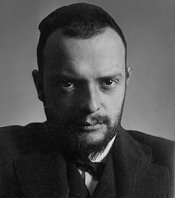
Paul Klee
(1879-1940)
Was scherimi ummi
Was scherimi ummi
I bi so guet wini
Der Kerli der i bi
kani nolang werde.
Spruchgedicht von Paul Klee, 1923
fleursdumal.nl magazine
More in: Archive K-L, Expressionism, Klee, Paul
.jpg)
Daniil Kharms
(1905-1942)
МАКАРОВ И ПЕТЕРСЕН (N 3)
МАКАРОВ: Тут, в этой книге написано, о наших желаниях и об исполнении их. Прочти эту книгу, и ты поймешь, как суетны наши желания. Ты также поймешь, как легко исполнить желание другого и как трудно исполнить желание свое.
ПЕТЕРСЕН: Ты что-то заговорил больно торжественно. Так говорят вожди индейцев.
МАКАРОВ: Эта книга такова, что говорить о ней надо возвышенно. Даже думая о ней, я снимаю шапку.
ПЕТЕРСЕН: А руки моешь, прежде чем коснуться этой книги.
МАКАРОВ: Да, и руки надо мыть.
ПЕТЕРСЕН: Ты и ноги, на всякий случай, вымыл бы!
МАКАРОВ: Это неостроумно и грубо.
ПЕТЕРСЕН: Да что же это за книга?
МАКАРОВ: Название этой книги таинственно…
ПЕТЕРСЕН: Хи-хи-хи!
МАКАРОВ: Называется эта книга МАЛГИЛ.
(Петерсен исчезает)
МАКАРОВ: Господи! Что же это такое? Петерсен!
ГОЛОС ПЕТЕРСЕНА: Что случилось? Макаров! Где я?
МАКАРОВ: Где ты? Я тебя не вижу!
ГОЛОС ПЕТЕРСЕНА: А ты где? Я тоже тебя не вижу!.. Что это за шары?
МАКАРОВ: Что же делать? Петерсен, ты слышишь меня?
ГОЛОС ПЕТЕРСЕНА: Слышу! Но что такое случилось? И что это за шары?
МАКАРОВ: Ты можешь двигаться?
ГОЛОС ПЕТЕРСЕНА: Макаров! Ты видишь эти шары?
МАКАРОВ: Какие шары?
ГОЛОС ПЕТЕРСЕНА: Пустите!.. Пустите меня!.. Макаров!..
(Тихо. Макаров стоит в ужасе, потом хватает книгу и раскрывает ее).
МАКАРОВ (читает): “…Постепенно человек утрачивает свою форму и становится шаром. И став шаром, человек утрачивает все свои желания”.
Занавес.
1934
Makarov und Petersen (no. 3)
Makarov: In diesem Buch hier ist alles über unsere Wünsche und deren Erfüllung geschrieben. Lies dieses Buch, und du wirst verstehen, wie nichtig unsere Wünsche sind. Du wirst auch verstehen, wie leicht es ist, einem anderen einen Wunsch zu erfüllen, und wie schwer es ist, sich selbst einen Wunsch zu erfüllen.
Petersen: Du hast es, nicht wahr, sehr feierlich gesagt. Die Indianerhäuptlinge sprächen mal so.
Makarov: Das ist ein solches Buch, davon man nur Erhabenes sprechen kann. Wenn ich nur daran denke, nehme ich meinen Hut ab.
Petersen: Wäschest du auch die Hände, bevor du es berührst?
Makarov: Ja, die Hände soll man auch waschen.
Petersen: Dann wüschest du auch mal die Füsse, um an der sicheren Seite zu sein.
Makarov: Das war nicht witzig und grob.
Petersen: Was ist es nur für ein Buch?
Makarov: Der Titel des Buches ist geheimnisvoll…
Petersen: Ha-ha-ha!
Makarov: Dieses Buch ist genannt MALGIL.
Petersen verschwindet.
Makarov: O Gott! Was ist denn das? Petersen!
Petersens Stimme: Was ist passiert? Makarov! Wo bin ich?
Makarov: Wo bist du? Ich kann dich nicht sehen.
Petersens Stimme: Und wo bist du denn? Ich kann dich auch nicht sehen!.. Was sind diese Sphären?
Makarov: Was sollen wir tun? Petersen, kannst du mich hören?
Petersens Stimme: Ich höre! Aber was ist denn passiert? Und was sind diese Sphären?
Makarov: Kannst du dich bewegen?
Petersens Stimme: Makarov! Siehst du diese Sphären?
Makarov: Welche Sphären?
Petersens Stimme: Laßt mich los!.. Laßt mich!.. Makarov!..
Stille. Makarov bleibt stehen in Erschrecken, dann greift das Buch und öffnet es.
Makarov (liest): “Allmählich verliert der Mensch seine Gestalt und wird in eine Sphäre verwandt. Und sobald er eine Sphäre wird, verliert er alle seine Wünsche.”
(Vorhang)
Makarov and Petersen (No. 3)
Makarov: This book here is about our desires and how to fulfill them. Read this book and you will understand the whole fuss about desire. You will also understand how easy it is to fulfill someone else’s desire and how hard it is to fulfill your own.
Petersen: You talk way too serious. You sound like an Indian leader.
Makarov: This book deserves to be spoken of with eminence. I take my hat off when I think about this book.
Petersen: Do you wash your hands right before you touch it?
Makarov: Yes, the hands must be washed.
Petersen: Do you think feet must be washed too?
Makarov: This is not funny but rude.
Petersen: So what is this book called?
Makarov: This book has a mysterious name…
Petersen: He-he-he!
Makarov: This book is called MALGIL.
(Petersen disappears
Makarov: Oh my God! What is this? Petersen!
Petersen’s voice: What happened? Makarov! Where am I?
Makarov: Where are you? I don’t see you!
Petersen’s voice: And where are you? I don’t see you either!.. What are these spheres?
Makarov: What shall I do? Petersen, do you hear me?
Petersen’s voice: I hear you! But what happened? And what are these spheres?
Makarov: Can you move?
Petersen’s voice: Makarov! Do you see these spheres?
Makarov: What spheres?
Petersen’s voice: Let me go!.. Let me go!.. Makarov!..
(Silence. Makarov stands terrified, than grabs the book and opens it).
Makarov (reads): “…Gradually, the man losses his shape and becomes a sphere. After he becomes a sphere, man losses all of his desires.”
(Curtains)
Daniil Kharms (Charms) Gedichte
Lino: Ivo van Leeuwen
fleursdumal.nl magazine
More in: Archive C-D, Archive K-L, Ivo van Leeuwen, Kharms (Charms), Daniil
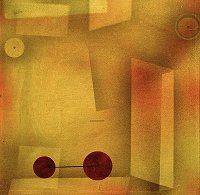
Paul Klee
(1879-1940)
Die Individualität ist nichts Elementares
Die Individualität ist nichts Elementares,
sondern ein Organismus,
Elementare Dinge unterschiedlicher Art
wohnen da unteilbar zusammen.
Wenn man teilen wollte,
stürben die Teile ab.
Mein Ich ist beispielsweise
ein ganzes dramatisches Ensemble,
da tritt ein prophetischer Urvater auf,
da brüllt ein brutaler Held.
Da räsoniert ein alkoholischer Bonvivant mit einem gelehrten Professor.
Da himmelt eine chronisch verliebte Lyrica.
Da tritt der Papa pedantisch entgegen.
Da vermittelt der nachsichtige Onkel.
Da tratscht die Tante Schwätz.
Da kichert die Zofe Schlüpfrig.
Und ich schaue zu mit erstaunten Augen,
die gespitzte Feder in der Linken.
Eine schwangere Mutter will auftreten.
Bscht! rufe ich, du gehörst nicht hierher.
Du bist teilbar.
Und sie verblaßt.
Paul Klee Gedicht, 1905
fleursdumal.nl magazine
More in: Archive K-L, Expressionism, Klee, Paul
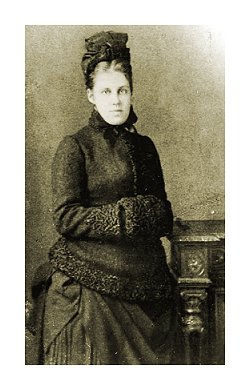
Emma Lazarus
(1849 – 1887)
Grief
There is a hungry longing in the soul,
A craving sense of emptiness and pain,
She may not satisfy nor yet control,
For all the teeming world looks void and vain.
No compensation in eternal spheres,
She knows the loneliness of all her years.
There is no comfort looking forth nor back,
The present gives the lie to all her past.
Will cruel time restore what she doth lack?
Why was no shadow of this doom forecast?
Ah! she hath played with many a keen-edged thing;
Naught is too small and soft to turn and sting.
In the unnatural glory of the hour,
Exalted over time, and death, and fate,
No earthly task appears beyond her power,
No possible endurance seemeth great.
She knows her misery and her majesty,
And recks not if she be to live or die.
Emma Lazarus poetry
fleursdumal.nl magazine
More in: Archive K-L, Lazarus, Emma
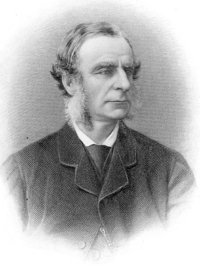
Charles Kingsley
(1819-1875)
Young And Old
When all the world is young, lad,
And all the trees are green;
And every goose a swan, lad,
And every lass a queen;
Then hey for boot and horse, lad,
And round the world away;
Young blood must have its course, lad,
And every dog his day.
When all the world is old, lad,
And all the trees are brown;
And all the sport is stale, lad,
And all the wheels run down;
Creep home, and take your place there,
The spent and maimed among:
God grant you find one face there,
You loved when all was young.
Charles Kingsley poetry
fleursdumal.nl magazine
More in: Archive K-L, CLASSIC POETRY
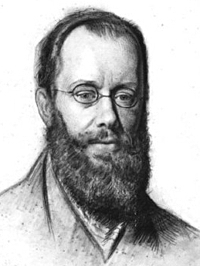
Edward Lear
(1812-1888)
The Owl and The Pussy-Cat
I
The Owl and the Pussy-cat went to sea
In a beautiful pea-green boat,
They took some honey, and plenty of money,
Wrapped up in a five-pound note.
The Owl looked up to the stars above,
And sang to a small guitar
‘O lovely Pussy! O Pussy, my love,
What a beautiful Pussy you are,
You are,
You are!
What a beautiful Pussy you are!
II
Pussy said to the Owl, ‘You elegant fowl!
How charmingly sweet you sing!
O let us be married! too long have we tarried;
But what shall we do for a ring?’
They sailed away, for a year and a day,
To the land where the Bong-tree grows
And there in the wood a Piggy-wig stood
With a ring at the end of his nose,
His nose,
His nose,
With a ring at the end of his nose.
III
‘Dear Pig, are you willing to sell for one shilling
Your ring?’ Said the Piggy, ‘I will.’
So they took it away, and were married next day
By the Turkey who lives on the hill.
They dined on mince, and slices of quince,
Which they ate with a runcible spoon;
And hand in hand, on the edge of the sand,
They danced by the light of the moon,
The moon,
The moon,
They danced by the light of the moon.
Edward Lear poetry
fleursdumal.nl magazine
More in: Archive K-L, Edward Lear, LIGHT VERSE
Freda
Kamphuis
Gevleugelde taal
In plaats van op een speciaal kerkhofje voor vliegen
zoals wij mensen dat zouden gaan doen
netjes afgerond voor het oog
ver boven vette vlezige maden
ligt dit nietige vliegje
begraven tussen twee bladzijden van mijn boek
de voor altijd zichtbare, leesbare doodsstrijd
gedrukt over mooie sierlijke letters heen
zo samenvallend zou het juist voor schrijvers moeten zijn
ons meelijwekkende silhouet in ons laatste boek
pas samengeklapt na onze dood natuurlijk
arme vlieg, kuierend, onwetend van wat komen ging
verpletterd in seconde van bruusk geweld
het keihard dichtklappende boek, nee poëziebundel zelfs
daar is toch niets dichterlijks aan?
gelukkig heb ik het niet gedaan
deze gruwelijke vliegenmoord niet op mijn geweten
misschien heeft de eerstehands eigenaar
erg geleden na het veroorzaken van dit leed
gelooft u het?
minder dan deze vlieg in ieder geval
dat is een feit
arme vlieg, u las geen poëzie
uw doder wel.
Freda Kamphuis
2012
fleursdumal.nl magazine
More in: Archive K-L, Kamphuis, Freda
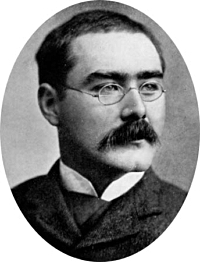
Rudyard Kipling
(1865-1936)
The Vampire
A fool there was and he made his prayer
(Even as you and I!)
To a rag and a bone and a hunk of hair
(We called her the woman who did not care)
But the fool he called her his lady fair
(Even as you and I!)
Oh, the years we waste and the tears we waste
And the work of our head and hand
Belong to a woman who did not know
(And now we know that she never could know)
And did not understand!
A fool there was and his goods he spent
(Even as you and I!)
Honour and faith and a sure intent
(And it wasn’t the least what the lady meant)
But a fool must follow his natural bent
(Even as you and I!)
Oh the toil we lost and the spoil we lost
And the excellent things we planned
Belong to the woman who didn’t know why
(And now we know that she never knew why)
And did not understand!
The fool was stripped to his foolish hide
(Even as you and I!)
Which she might have seen as she threw him aside
(But it isn’t on record the lady tried)
So some of him lived but the most of him died
(Even as you and I!)
And it isn’t the shame and it isn’t the blame
That stings like a white hot brand
It’s coming to know that she never knew why
(Seeing, at last, she could never knew why)
And never could understand!
Rudyard Kipling poetry
fleursdumal.nl magazine
More in: Archive K-L, Archive K-L, CLASSIC POETRY, Kipling, Rudyard
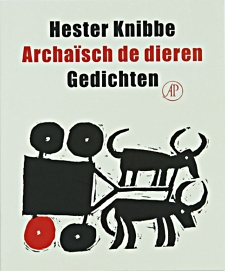
De Rotterdamse dichteres Hester Knibbe krijgt de prijs voor de beste Nederlandstalige dichtbundel van het afgelopen jaar voor haar bundel Archaïsch de dieren (Uitgeverij De Arbeiderspers). Knibbe ontving de prijs tijdens een feestelijke avond in de Kunsthal in Rotterdam uit handen van juryvoorzitter Peter Vandermeersch, hoofdredacteur van NRC Handelsblad. Aan de prijs is een geldbedrag van 25.000 euro verbonden en een glaskunstwerk van kunstenares Maria Roosen. Ook de dichters Piet Gerbrandy, Sasja Janssen, Alfred Schaffer en Peter Verhelst maakten kans op deze jaarlijkse prijs voor Nederlandstalige poëzie.
De jury roemt Knibbes stevige, klankrijke en toch hoogst hedendaagse vorm en taal waarmee ze in staat is grote vragen te stellen
waartoe zijn wij op aarde, hoe kunnen we samen leven terwijl
er zoveel ‘wonden op de wereld’ zijn, hoe kunnen we onze doden herdenken
zonder dat ze topzwaar worden of bezwijken onder hun eigen gewicht. In haar voldragen bundel keert Knibbe terug naar de wil tot weten van de allereerste mens en de verdrijving uit het paradijs die daarop volgt. Antwoorden zijn er niet te vinden in deze gedichten; de goden geven niet thuis. Mythische verbanden zijn er echter des te meer, bijvoorbeeld in de zangerige en klankrijke taal van Knibbe.
De jury was speciaal ingenomen met de sterke samenhang en dwingende stuwende kracht in deze belangrijke bundel, die de mens tot zijn ontgoochelende kern terugbrengt en vervolgens warm omhelst.
De jury, die naast voorzitter Peter Vandermeersch bestond uit uit Yra van Dijk, Ruth Joos, Peter Theunynck en Antoine de Kom, nomineerde in november vijf van de in totaal 107 ingezonden bundels die tussen 1 september 2013 en 31 augustus 2014 zijn verschenen. Uit alle ingezonden bundels koos juryvoorzitter Peter Vandermeersch zijn 100 favoriete gedichten voor de bloemlezing De 100 beste gedichten. De uitgave van De Arbeiderspers en Stichting VSB Poëzieprijs is tijdens de prijsuitreiking gepresenteerd en is vanaf vandaag verkrijgbaar in de boekhandel.
Ter gelegenheid van de Poëzieweek is het gedicht Laten we de oude … uit de winnende bundel Archaïsch de dieren van Hester Knibbe door Poetry International als poster uitgebracht. De poster is te bestellen via info@poetry.nl
# Meer informatie op website Poetry International
fleursdumal.nl magazine
More in: Archive K-L, Art & Literature News, Poetry International

Richard Lovelace
(1618-1657)
To Lucasta. The Rose
I.
Sweet serene skye-like flower,
Haste to adorn her bower;
From thy long clowdy bed
Shoot forth thy damaske head.
II.
New-startled blush of Flora!
The griefe of pale Aurora,
Who will contest no more,
Haste, haste, to strowe her floore.
III.
Vermilion ball, that’s given
From lip to lip in Heaven;
Loves couches cover-led,
Haste, haste, to make her bed.
IV.
Dear offspring of pleas’d Venus,
And jollie plumpe Silenus;
Haste, haste, to decke the haire,
Of th’ only sweetly faire.
V.
See! rosie is her bower,
Her floore is all this flower;
Her bed a rosie nest
By a bed of roses prest.
VI.
But early as she dresses,
Why fly you her bright tresses?
Ah! I have found, I feare;
Because her cheekes are neere.
Richard Lovelace poetry
fleursdumal.nl magazine
More in: Archive K-L, CLASSIC POETRY
The Day is Done
The day is done, and the darkness
Falls from the wings of Night,
As a feather is wafted downward
From an eagle in his flight.
I see the lights of the village
Gleam through the rain and the mist,
And a feeling of sadness comes o’er me
That my soul cannot resist:
A feeling of sadness and longing,
That is not akin to pain,
And resembles sorrow only
As the mist resembles the rain.
Come, read to me some poem,
Some simple and heartfelt lay,
That shall soothe this restless feeling,
And banish the thoughts of day.
Not from the grand old masters,
Not from the bards sublime,
Whose distant footsteps echo
Through the corridors of Time.
For, like strains of martial music,
Their mighty thoughts suggest
Life’s endless toil and endeavor;
And to-night I long for rest.
Read from some humbler poet,
Whose songs gushed from his heart,
As showers from the clouds of summer,
Or tears from the eyelids start;
Who, through long days of labor,
And nights devoid of ease,
Still heard in his soul the music
Of wonderful melodies.
Such songs have power to quiet
The restless pulse of care,
And come like the benediction
That follows after prayer.
Then read from the treasured volume
The poem of thy choice,
And lend to the rhyme of the poet
The beauty of thy voice.
And the night shall be filled with music,
And the cares, that infest the day,
Shall fold their tents, like the Arabs,
And as silently steal away.
Henry Wadsworth Longfellow
More in: Archive K-L, Longfellow, Henry Wadsworth

Ode
Aan jou opdragen, op onze drempel
van verstomming, een ode met woorden
die jou betovert, wil ik je gezel
naast mijn vermommingen zijn, openheid
aan jou tonen, toch verzand ik laf in
mijn opzet, ontluik jij, warm en bereid
maar zie ik haar voor mij in het begin
van een morgen, hoe ze mij bekoorde
zich naakt en koel van mij wendde, en ging
met de zon die binnen schoof op bussels
stof, de deur geruisloos open gleed, de
drempel sleets vertreden met mijn odes
Niels Landstra
fleursdumal.nl magazine
More in: Archive K-L, Landstra, Niels
Thank you for reading Fleurs du Mal - magazine for art & literature